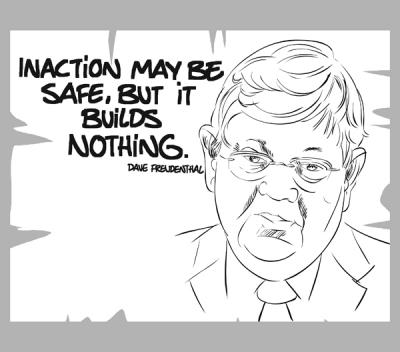There is no doubt about it. Economic turmoil is holding back the development of the nation in every possible respect: education, ecologically-sound investment & development, public services and health-care. Weakness today damages tomorrow’s prospects for the nation’s fiscal and public happiness, so how do we get back on track?
One phrase has stood the test of time, ‘If something is not working, do something, anything, different!’
Rash, ‘anything different’ actions may not be the best actions, but action is anyway what is needed. Inaction is not the answer for Mauritius. To initiate reasoned action, we need fresh thoughts and a fresh psychological attitude. For fresh psychological attitude, look no further than our own Vicash Purryag, CEO at Sega Tours. When it comes to the dreaded ‘R’ word (recession), he says, “I’m ignoring it. The pace of business success is created by action, not inaction”. For Mr Purryag, the economy is forever a bull market, not a bear market; he holds firm to his business and he structures actions for realistic growth.
Secondly, we need fresh thoughts to explore and develop avenues for success. How do we create the right, fresh thoughts?
Questioning and challenging every known business belief
When the sands of our economic beach are shifting, human nature leads us to find solid ground. In management, solid ground means holding on to our existing truths, even when some of these are out-dated and part of the problem. When we hear ourselves, or colleagues saying, ‘stick to what we know best’, be careful. Best practice may have saved your SME from sinking for 70 years, but the world moved on – what was working may no longer save you now.
There are other players along the Indian Ocean rim. Global competition, changing product needs, lower prices, different supply chains are all creating both a tidal wave of bad news and a wash of good news for the most nimble players. We have to join those players by having nimble minds. Failure to adapt sends us the way of the dodo – as Darwin proposed, it is all about ‘survival of the fittest’. Adapt, action, adapt, action.
To accomplish that flexibility of mind, we need to encourage challenge, allow others to challenge us, free ourselves to challenge our peers and masters, and of course, self-challenge our own beliefs and prejudices. The best way to start, is by rewarding challenge with positive feedback. Rewards can be simple and cheap: recognition, acknowledgement (including the acknowledgement of our own steps forward) – these all cost nothing.
Proactive Wide-Listening
Now that we are accepting the value in well-intended ideas, we also need to expand the source of these ideas. If the environment of our work is not as successful as we want, we should be seeking views from other environments that change and grow successfully. The market we go to for these insights does not have to be in our own markets, as long as there are potential lessons to be learned about aspects that are similar. For example: exchange rates, import taxes, just-in-time, payment regimes, supply methods and internet marketing. None of these are product-dependent. The Institute of Directors, Lions Club and other networks are immediate sources of successful experience. Beyond our shores, there is scope for learning from our own supply chains: job-swaps with our partner organizations, for example, can create improved ways of working and reduce administration and costs. Non-executive Directors can also add experience that may be vital to new business. Do not look for people like yourself or your family, look elsewhere and actively desire the challenge of different perspectives. The views that got you into business difficulty are not the views that will get you out of the turmoil. Look outside. This perspective is also a brave new mantra for Government as it is for many Mauritian businesses. Tired thinking needs fresh blood and challenge from outside the cabal to create an environment of success – but we have to be ready for the challenges; to welcome them.
Inclusive Thinking
Another challenge for Mauritius is the lack of women in our small and medium-sized enterprises. The lack of female insight is often a serious feature of business failure. Half our consumers are women. Women are inherently better at forging and sustaining trusting relationships than many men. We need their voices on our boards, not just their presence on them. Internationally, business performance correlates with the proportion of women on the board. It is to be expected that boards with few or no men would also be weakened. The argument is the same, we need a breadth of views on our boards to make performance-advantages in difficult times.
Leadership for Success in Difficult Times
- Publicité -
EN CONTINU ↻


